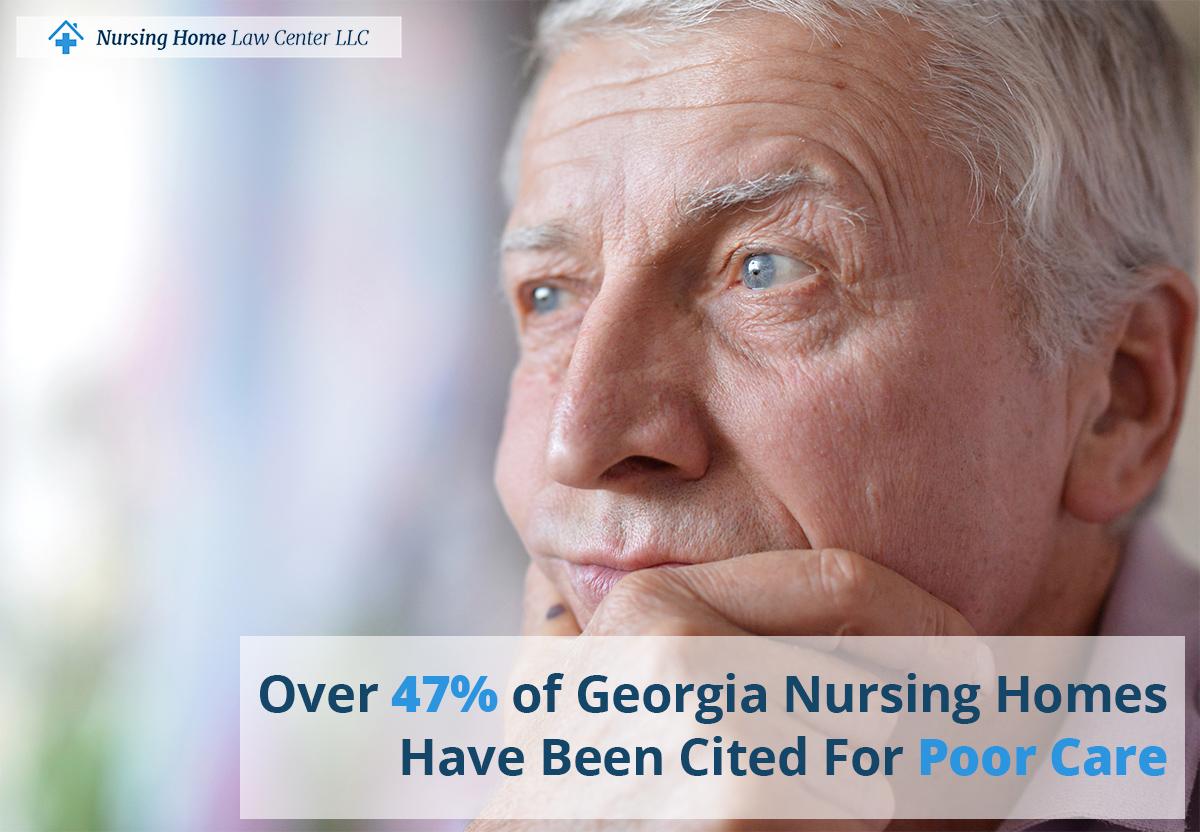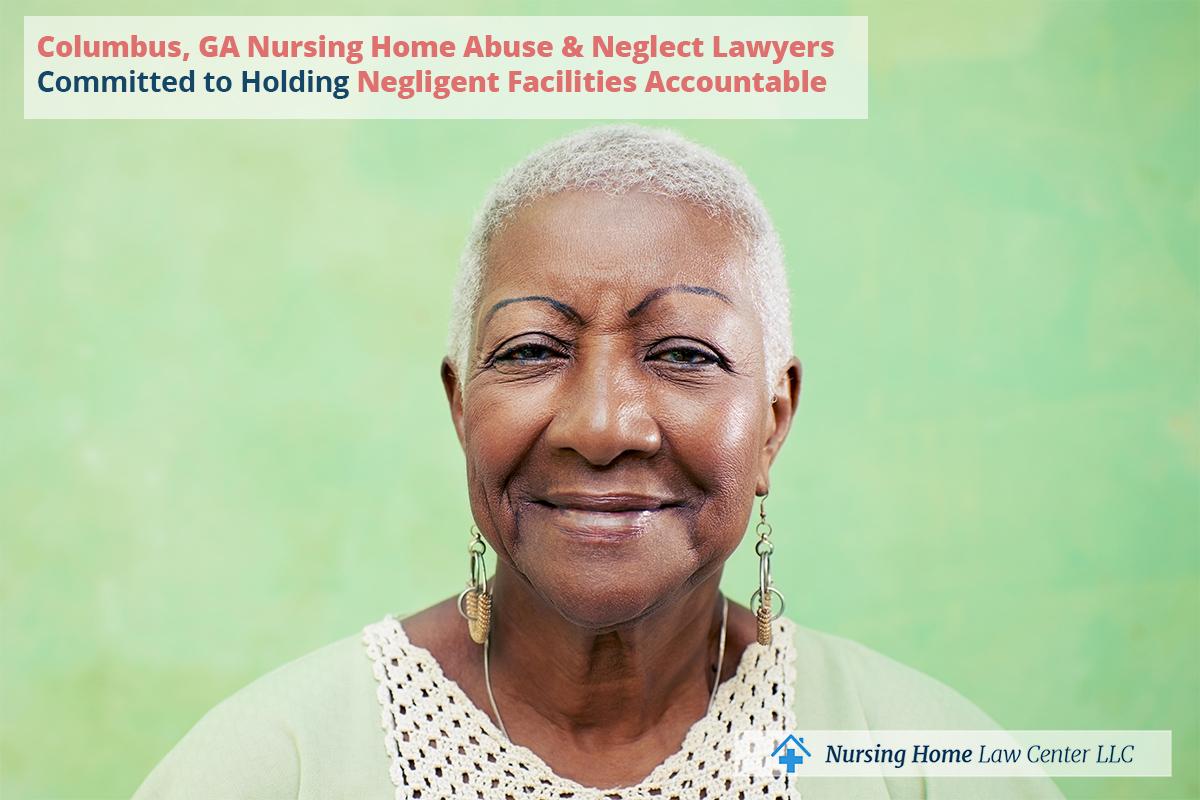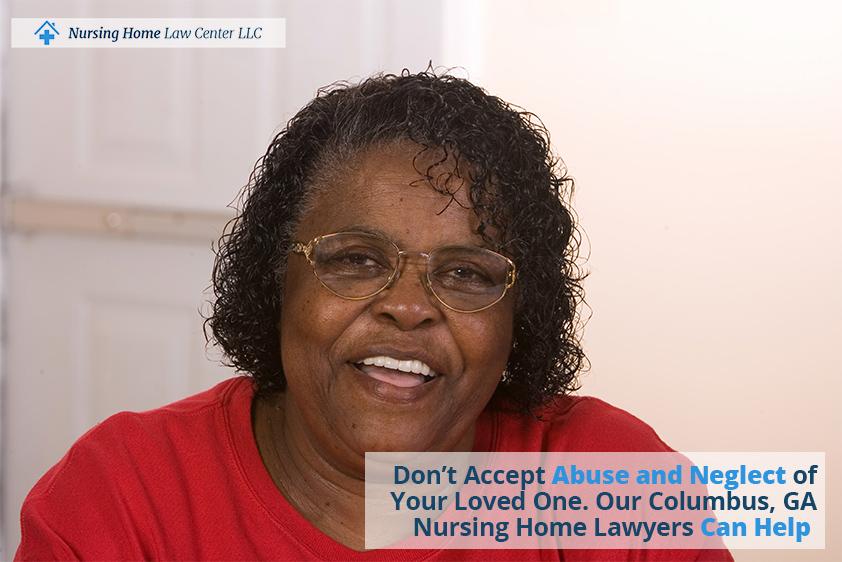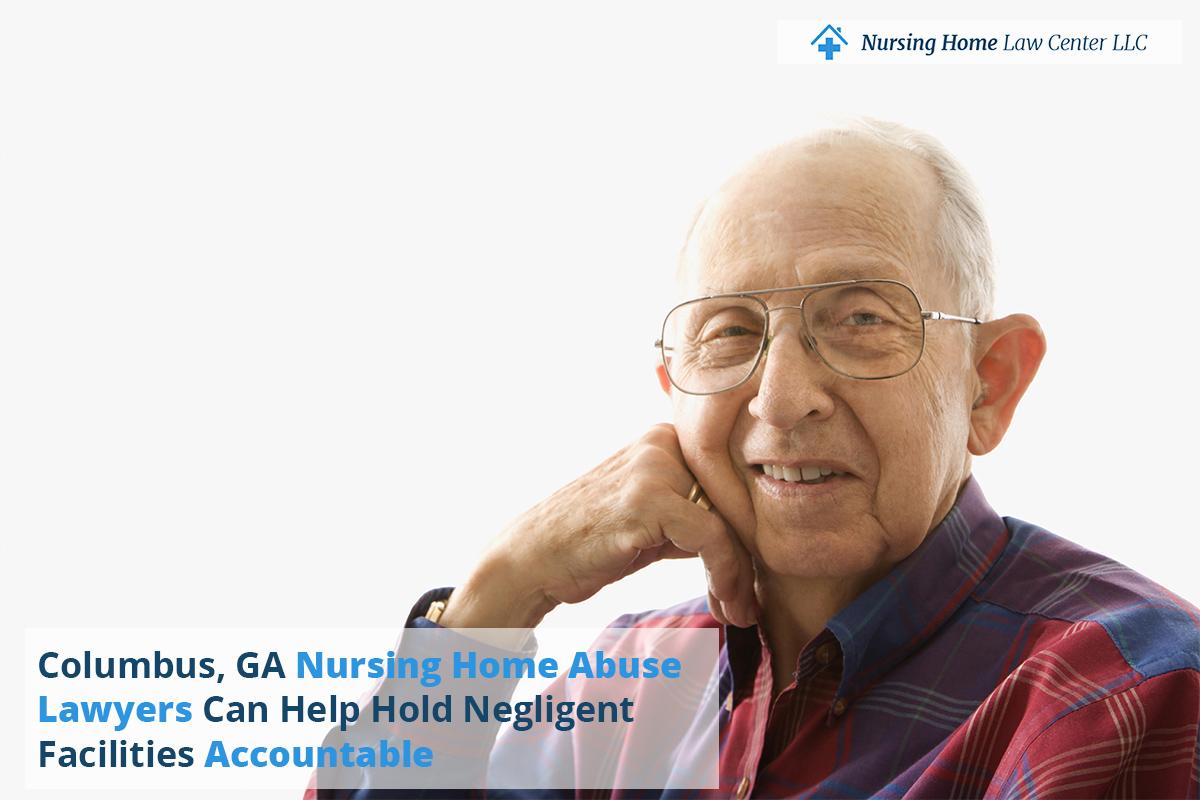The Nursing Home Law Center is committed to providing the legal resources necessary to hold negligent facilities accountable.
Columbus, GA Nursing Home Abuse Lawyer

Licensed in Georgia
Nursing home abuse is a devastating reality for many vulnerable residents in Columbus, Georgia, and across the country. Elderly individuals in nursing homes and assisted living facilities often suffer from neglect, emotional trauma, physical assault, and even financial exploitation.
For victims and their families, recognizing the signs of abuse and taking swift action is critical. Seeking legal help from an experienced Columbus nursing home abuse lawyer can ensure that victims’ rights are protected and those responsible are held accountable.
Why Hire Nursing Home Law Center
At Nursing Home Law Center, we are dedicated to obtaining justice and compensation for those affected by nursing home abuse. Our skilled legal team has a strong history of handling abuse cases with care, achieving substantial settlements and verdicts.
We carry out detailed investigations to address every aspect of the abuse, including medical costs, emotional distress, and other damages. With our extensive knowledge of nursing home abuse claims, we handle the legal challenges with precision and work relentlessly to safeguard your rights.
We offer compassionate, clear guidance, ensuring you and your family remain informed and supported throughout the process.

Types of Cases Handled by Our Columbus Nursing Home Abuse Lawyers
Nursing home abuse involves the mistreatment or neglect of elderly or vulnerable residents in a care facility, leading to physical, emotional, or financial harm. Abuse can take many forms, and it is crucial to recognize the various types to protect nursing home residents from further suffering.
Physical Abuse
Physical abuse in nursing homes includes acts of violence like hitting, kicking, or improperly using restraints on residents. This form of abuse can lead to serious injuries such as bruises, broken bones, and other physical injuries. In some cases, staff members may misuse restraints, causing bodily harm or unnecessary discomfort.
Mental and Emotional Abuse
Mental and emotional abuse involves inflicting psychological harm through intimidation, threats, or verbal abuse. Residents subjected to emotional abuse may experience isolation, depression, or anxiety. Verbal insults, humiliating remarks, and threats of punishment are typical examples of this form of abuse.
Sexual Abuse
Sexual abuse occurs when a resident is forced into non-consensual sexual contact. This form of abuse can be particularly devastating, leaving lasting physical and emotional scars. Sexual abuse in nursing homes may go unnoticed due to the victim’s vulnerability or inability to report the abuse.
Medical Malpractice
Medical malpractice in nursing homes often results from improper medical care, such as neglecting to treat bedsores, making medication errors, or failing to provide timely treatment. Inadequate medical attention can lead to serious health complications or even death, putting residents at significant risk.
Negligence
Negligence occurs when a nursing home fails to meet the standard of care expected for residents. Examples include poor hygiene, malnutrition, dehydration, and elopement, where residents wander unsupervised. Negligence can result in deteriorating health, infections, and preventable accidents.
Financial Abuse
Financial abuse involves the exploitation or manipulation of a resident’s finances by staff members or other individuals. This abuse may include theft of personal belongings, unauthorized access to bank accounts, or coercing residents into signing financial documents, such as wills or contracts.
Wrongful Death
Wrongful death in a nursing home can occur due to extreme neglect, medical malpractice, or abuse. When the actions or inactions of the facility lead to a resident’s death, their family may pursue a wrongful death lawsuit to hold the nursing home accountable for their loss.
Understanding Your Legal Rights
Federal and state laws protect nursing home residents and are designed to ensure their safety, dignity, and quality of care.
One of the most critical federal protections is the Nursing Home Reform Act of 1987, which establishes the right of residents to receive proper medical care, be free from abuse and neglect, and maintain their dignity.
Under this law, residents have the right to voice grievances, participate in decisions about their care, and be informed about their treatment and any changes in their condition.
In Georgia, state regulations also safeguard residents, holding nursing homes accountable for providing adequate care. These laws require nursing facilities to meet specific standards regarding staffing, medical care, and resident safety.
Eligibility to File an Elder Abuse Claim
If a resident suffers from abuse, neglect, or poor treatment, certain individuals have the legal right to file a nursing home abuse lawsuit on their behalf.
Claims can be filed directly by the resident, a family member, or a legal guardian acting in the resident’s best interest. In cases involving a resident’s death, the right to file a wrongful death claim may fall to any surviving family member.
Nursing home abuse lawyers can help guide families through the legal process and protect the rights of their loved ones.
Liability in Nursing Home Neglect and Abuse Cases
In nursing home neglect and abuse cases, multiple parties can be held liable for the harm caused to residents. Determining liability is crucial for holding those responsible accountable and securing fair compensation for victims.
- Nursing Home Staff: Individual staff members who commit acts of abuse or neglect are directly responsible for harming residents. These acts include cases of physical violence, psychological abuse, and inadequate medical care.
- Nursing Home Administration: The administration can be liable if the nursing facility fails to train or supervise employees adequately or ignores apparent signs of abuse. Poor management, sub-par hiring practices, or inadequate staffing levels often contribute to neglect and abuse cases.
- Third-Party Contractors: Sometimes, third-party medical providers, maintenance staff, or other contractors working with the nursing home may contribute to neglect, such as failing to provide necessary medical care or ensuring safety standards.
- Corporate Ownership: If the nursing home is part of a larger corporation, the parent company may also be liable for failing to ensure adequate policies, oversight, or resources to prevent abuse and neglect.

How Our Columbus Nursing Home Abuse Attorneys Can Help
At Nursing Home Law Center, our team of experienced nursing home abuse attorneys is dedicated to fighting for the rights of vulnerable residents in Columbus and securing justice for victims and their families.
With years of experience handling complex nursing home abuse cases, we understand the emotional and financial toll these situations can take. Our attorneys are committed to guiding you through every step of the legal process and ensuring those responsible are held accountable.
Free Case Evaluation
We offer a free consultation to discuss the details of your case and help you understand your legal options. This initial step allows us to assess whether you have a strong case and what type of compensation may be available.
Case Investigation
Our team conducts a thorough investigation into the nursing home abuse or nursing home neglect that occurred. We gather crucial evidence, such as medical records, witness statements, and any documentation of the abuse, to build a solid foundation for your claim.
Filing the Claim
Once we have collected the necessary evidence, we will file a nursing home abuse lawsuit on your behalf. Our attorneys handle all the paperwork and legal proceedings, ensuring your claim is filed correctly and on time.
Settlement Negotiation
In many cases, we can reach a fair settlement through negotiation with the nursing home or their insurance company. We work to secure the financial compensation your family deserves, covering medical expenses, emotional trauma, and other damages caused by the abuse.
Trial Representation
Our attorneys are fully prepared to take your case to trial if a fair settlement cannot be reached. We will present a compelling case to the court to ensure your loved one receives justice and fair compensation for their suffering.
Common Signs of Elder Abuse Among Nursing Home Residents
Elder abuse in nursing homes can often go unnoticed, but recognizing the warning signs is crucial to protecting your loved ones. Below are some common signs to watch for:
- Unexplained Injuries: Bruises, cuts, broken bones, or burns that have no clear explanation could indicate physical assault.
- Emotional Withdrawal: If a normally social resident becomes withdrawn, anxious, or depressed, this may be a sign of emotional abuse or mental abuse.
- Poor Hygiene: Nursing home neglect can result in residents having poor personal hygiene, including unclean clothes, bedsores, or a general lack of care.
- Sudden Weight Loss or Malnutrition: Neglect may lead to malnutrition or dehydration, especially if the resident is not provided adequate food or water.
- Fear of Certain Staff Members: If a resident appears frightened or anxious around specific caregivers or nursing home staff members, it could signal ongoing abuse.
- Financial Irregularities: Financial abuse may involve sudden changes in the resident’s bank account, missing belongings, or unauthorized changes to legal documents.
The worst-rated nursing homes in Columbus include:
| River Towne Center | Canterbury Health Care Facility |

What to Do If You Suspect Nursing Home Abuse
If you suspect that your loved one is a victim of nursing home abuse, it’s crucial to take action immediately to protect their safety and well-being. Here are the steps you should follow:
- Call 911 if Immediate Danger Exists: If you believe your loved one is in immediate danger or has suffered severe physical harm, contact emergency services right away.
- Report to the Nursing Home Administrator or Management: Notify the nursing home administrator or management about your concerns. Document the interaction and request an immediate investigation into the alleged abuse.
- File a Complaint with Your Local Ombudsman’s Office: Your local Ombudsman advocates for nursing home patients and can help investigate abuse claims. They are responsible for ensuring that residents’ rights are respected and will work to resolve complaints.
- Contact a Nursing Home Abuse Lawyer: Speak with an experienced nursing home abuse lawyer to discuss your legal options. They can help you gather evidence, pursue a nursing home abuse case, and seek compensation for your loved one’s injuries and suffering.
Damages You Can Recover Through a Nursing Home Abuse Claim
When pursuing a nursing home lawsuit, victims and their families may be entitled to various types of compensation, depending on the circumstances of the case. Here are examples of the types of damages that can be recovered:
Economic Damages
These are quantifiable financial losses resulting from the abuse. Examples include:
- Medical bills: Costs for treatments, hospital stays, or therapy.
- Medical expenses: Ongoing care, rehabilitation, or future medical costs related to the abuse.
- Lost financial support: If the resident contributed financially and can no longer do so due to the abuse or wrongful death.
Non-Economic Damages
These damages compensate for intangible losses. Examples include:
- Emotional trauma: Compensation for pain, suffering, and emotional distress caused by the abuse.
- Mental anguish: Compensation for psychological harm such as post-traumatic stress disorder or anxiety.
- Loss of enjoyment of life: A significant decline in the resident’s quality of life due to the abuse.
Punitive Damages
These are awarded in cases where the nursing home’s conduct was particularly egregious. Punitive damages are meant to punish the wrongdoers and deter similar behavior in the future.

The Cost of Hiring a Columbus Nursing Home Abuse Lawyer
At the Nursing Home Law Center, we work on a contingency fee basis for all nursing home abuse cases. This means that there are no upfront costs or out-of-pocket expenses for hiring our Columbus nursing home abuse lawyers. We only get paid if we successfully secure compensation for you through a settlement or verdict.
This arrangement allows families to pursue justice without worrying about the financial burden of legal fees, ensuring that your focus remains on the well-being of your loved one. You can trust us to fight for your rights while you pay nothing unless we win your case.
You Have Limited Time to Take Legal Action in Columbus
In Columbus, Georgia, the statute of limitations offers a limited window to file a nursing home abuse lawsuit. This law sets a strict deadline for taking legal action, typically two years from the date the abuse occurred or was discovered.
If you miss this deadline, you may lose your right to pursue compensation and hold the nursing home liable. It’s important to consult with a Columbus nursing home abuse lawyer as soon as possible to ensure your claim is filed within the legal timeframe and that you have the best chance at securing justice for your loved one.
Contact a Columbus Nursing Home Abuse Attorney Today!
At the Nursing Home Law Center, our experienced team of Georgia nursing home abuse attorneys has a proven track record of securing justice and compensation for victims of nursing home negligence and abuse.
We are committed to protecting the rights of vulnerable residents and holding negligent facilities accountable. With a comprehensive approach, including free consultations, thorough investigations, and skilled representation, we fight tirelessly for your family’s peace of mind.
If you suspect that your loved one has suffered abuse or neglect, don’t wait—contact us today for a free consultation. Let us help you seek justice and the compensation your family deserves!
Call us at (800) 926-7565 or fill out our contact form.

